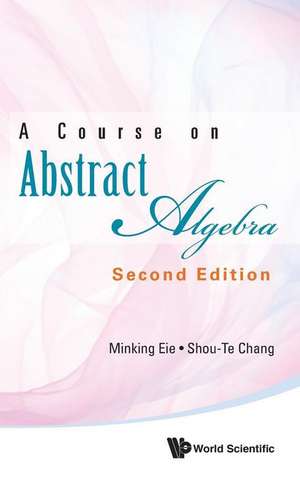COURSE ABSTRACT ALGEBRA (2ND ED)
Autor Minking Eieen Limba Engleză Hardback – 15 sep 2017
Three whole new chapters are added to this second edition. Group action is introduced to give a more in-depth discussion on Sylow's theorems. We also provide a formula in solving combinatorial problems as an application. We devote two chapters to module theory, which is a natural generalization of the theory of the vector spaces. Readers will see the similarity and subtle differences between the two. In particular, determinant is formally defined and its properties rigorously proved.
The textbook is more accessible and less ambitious than most existing books covering the same subject. Readers will also find the pedagogical material very useful in enhancing the teaching and learning of abstract algebra.
Preț: 496.77 lei
Preț vechi: 635.96 lei
-22% Nou
95.09€ • 103.32$ • 79.92£
Carte disponibilă
Livrare economică 20-27 martie
Specificații
ISBN-10: 9813229624
Pagini: 417
Dimensiuni: 157 x 235 x 28 mm
Greutate: 0.74 kg
Editura: World Scientific
Descriere
This textbook provides an introduction to abstract algebra for advanced undergraduate students. Based on the authors' notes at the Department of Mathematics, National Chung Cheng University, it contains material sufficient for three semesters of study. It begins with a description of the algebraic structures of the ring of integers and the field of rational numbers. Abstract groups are then introduced. Technical results such as Lagrange's theorem and Sylow's theorems follow as applications of group theory. The theory of rings and ideals forms the second part of this textbook, with the ring of integers, the polynomial rings and matrix rings as basic examples. Emphasis will be on factorization in a factorial domain. The final part of the book focuses on field extensions and Galois theory to illustrate the correspondence between Galois groups and splitting fields of separable polynomials.
Three whole new chapters are added to this second edition. Group action is introduced to give a more in-depth discussion on Sylow's theorems. We also provide a formula in solving combinatorial problems as an application. We devote two chapters to module theory, which is a natural generalization of the theory of the vector spaces. Readers will see the similarity and subtle differences between the two. In particular, determinant is formally defined and its properties rigorously proved.
The textbook is more accessible and less ambitious than most existing books covering the same subject. Readers will also find the pedagogical material very useful in enhancing the teaching and learning of abstract algebra.
